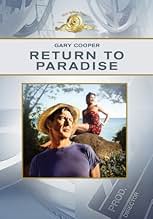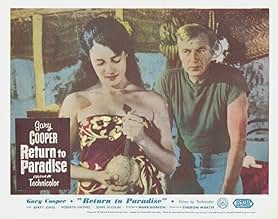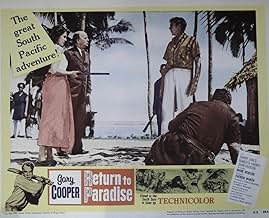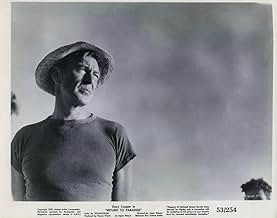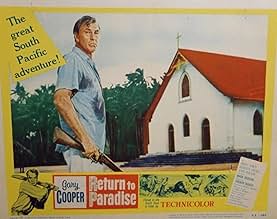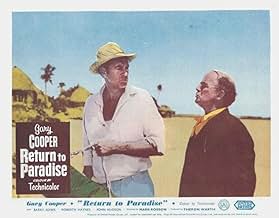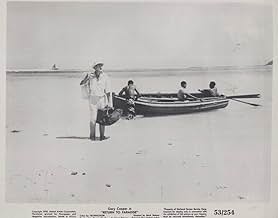CALIFICACIÓN DE IMDb
6.0/10
905
TU CALIFICACIÓN
Agrega una trama en tu idiomaAn American drifter comes to a remote Polynesian island controlled by a Puritanical missionary and turns the social life of the island upside-down.An American drifter comes to a remote Polynesian island controlled by a Puritanical missionary and turns the social life of the island upside-down.An American drifter comes to a remote Polynesian island controlled by a Puritanical missionary and turns the social life of the island upside-down.
- Dirección
- Guionistas
- Elenco
Moira Walker
- Turia
- (as Moira MacDonald)
Mamea Matatumua
- Tonga
- (as Chief Mamea Matatumua)
Va'a
- Rori at age 9
- (as Felice Va'a)
Frances Gow
- Mrs. Talbot
- (escenas eliminadas)
Brian McEwen
- Hank Elliott
- (escenas eliminadas)
Web Overlander
- Will Talbot
- (escenas eliminadas)
Henrietta Godinet
- Povana
- (sin créditos)
- Dirección
- Guionistas
- Todo el elenco y el equipo
- Producción, taquilla y más en IMDbPro
Opiniones destacadas
Return to Paradise's main problem is that Gary Cooper at 52 is way too old for the part of the hedonistic Mr. Morgan. The part should have been played by someone like Kirk Douglas, William Holden, or Burt Lancaster.
Having said that Coop does all right in the role of the man whose arrival on one of the islands of the Samoan archipelago changes all around him.
The story begins in the late twenties when Cooper is put ashore on an island that is ruled by a tyrannical missionary preacher, Barry Jones, who's got 'wardens' to make sure that his decrees about the island's morality is enforced. Instinctively he knows that Cooper's arrival means trouble for his social order and tries to order him off the island. He even has Cooper's fledgling grass hut torn down because he's working on the sabbath.
But Coop's independent ways spark the latent resistance growing in the population. His taking on the 'wardens' is all that's needed.
Cooper has also fallen in love with a young Samoan girl, the beautiful Roberta Haynes. When she dies in childbirth, he leaves and becomes a charter schooner captain. Years later he returns and has to face up to his responsibility as a father.
A lot of Return to Paradise is a test of wills between Cooper and Barry Jones and at first glance Jones's character almost seems a caricature of a fire and brimstone preacher. It's not by any means on several levels. In his later work Hawaii, author James Michener explores that whole angle of the American missionaries in the 19th century and their impact on that Polynesian culture.
As he says in the film, Jones's father was killed in a native uprising and his wife died in childbirth. It made him bitter at the world and resulted in his creating a Christian Taliban like state on the island.
But there's a lot more to Jones than that. It turns out that the natives really did want to hear the good parts of his gospel and did not slacken in church attendance. There's a scene in the film when he sees the natives coming into his church where instead of going to the pulpit, he sits in the congregation among the natives. It's more eloquent than ten pages of dialog.
Jones becomes a better man and a wiser preacher as a result of Cooper's rebellion. He turns out to be a wise counselor indeed, especially when Cooper returns to the island and faces a crisis about his now teenage daughter, Moira McDonald. Essentially Cooper and Jones heal each other of the flaws in their respective characters.
Return to Paradise boasted a nice title song that is heard throughout the film. Later on Bing Crosby also used it as the title track of an album he did of south sea music for Frank Sinatra's Reprise label. It was composed by Dimitri Tiomkin and Ned Washington who last year gave Cooper that unforgettable theme from High Noon.
Filmed entirely on location on Samoa, it's a stunningly beautiful film to watch. You can't make a bad film from with that location.
It's one of Gary Cooper's lesser known works, but it's not a bad film and holds up well after over 50 years.
Having said that Coop does all right in the role of the man whose arrival on one of the islands of the Samoan archipelago changes all around him.
The story begins in the late twenties when Cooper is put ashore on an island that is ruled by a tyrannical missionary preacher, Barry Jones, who's got 'wardens' to make sure that his decrees about the island's morality is enforced. Instinctively he knows that Cooper's arrival means trouble for his social order and tries to order him off the island. He even has Cooper's fledgling grass hut torn down because he's working on the sabbath.
But Coop's independent ways spark the latent resistance growing in the population. His taking on the 'wardens' is all that's needed.
Cooper has also fallen in love with a young Samoan girl, the beautiful Roberta Haynes. When she dies in childbirth, he leaves and becomes a charter schooner captain. Years later he returns and has to face up to his responsibility as a father.
A lot of Return to Paradise is a test of wills between Cooper and Barry Jones and at first glance Jones's character almost seems a caricature of a fire and brimstone preacher. It's not by any means on several levels. In his later work Hawaii, author James Michener explores that whole angle of the American missionaries in the 19th century and their impact on that Polynesian culture.
As he says in the film, Jones's father was killed in a native uprising and his wife died in childbirth. It made him bitter at the world and resulted in his creating a Christian Taliban like state on the island.
But there's a lot more to Jones than that. It turns out that the natives really did want to hear the good parts of his gospel and did not slacken in church attendance. There's a scene in the film when he sees the natives coming into his church where instead of going to the pulpit, he sits in the congregation among the natives. It's more eloquent than ten pages of dialog.
Jones becomes a better man and a wiser preacher as a result of Cooper's rebellion. He turns out to be a wise counselor indeed, especially when Cooper returns to the island and faces a crisis about his now teenage daughter, Moira McDonald. Essentially Cooper and Jones heal each other of the flaws in their respective characters.
Return to Paradise boasted a nice title song that is heard throughout the film. Later on Bing Crosby also used it as the title track of an album he did of south sea music for Frank Sinatra's Reprise label. It was composed by Dimitri Tiomkin and Ned Washington who last year gave Cooper that unforgettable theme from High Noon.
Filmed entirely on location on Samoa, it's a stunningly beautiful film to watch. You can't make a bad film from with that location.
It's one of Gary Cooper's lesser known works, but it's not a bad film and holds up well after over 50 years.
From the first day he was 'deposited' on the tiny South Pacific island, all Cooper was looking for a little peace and quiet. What he got was a bible thumper with a bad attitude, who meant well, but his priorities were a little screwed up. When Cooper hits the island, the "preacher" does everything in his power to let Cooper know he's not welcome. The narrator in the beginning lets us know right away that something is not right with the island natives, but they don't know if they can do anything about it.
After the girl he falls in love with is jailed, Cooper fights to break her out and eventually ends up leading the natives in a revolt. He settles down to a life on the island, but the sea calls to him whenever someone seems to get too close to him. And the man who is his worst enemy turns to him for help when the going gets tough.
As a movie watcher, this is not my "cup of tea." But my significant other recorded it the other night off one of the classic channels and I had nothing better to do, so I started watching it. Next thing I knew, it was after midnight and the movie was ending. As I said, I never really get into the older movies, but I did find this one rather enjoyable and I will be watching for more of Gary Cooper in the future.
After the girl he falls in love with is jailed, Cooper fights to break her out and eventually ends up leading the natives in a revolt. He settles down to a life on the island, but the sea calls to him whenever someone seems to get too close to him. And the man who is his worst enemy turns to him for help when the going gets tough.
As a movie watcher, this is not my "cup of tea." But my significant other recorded it the other night off one of the classic channels and I had nothing better to do, so I started watching it. Next thing I knew, it was after midnight and the movie was ending. As I said, I never really get into the older movies, but I did find this one rather enjoyable and I will be watching for more of Gary Cooper in the future.
Let's get one thing straight, the actors in this movie are portraying Pacific Islanders NOT aboriginals.
I like this movie if only for the fact that it is probably the only Hollywood movie that was filmed in Western Samoa . It still gets played regularly there on one of the countries two t.v stations and it even has a beach proudly named after it where it was filmed on the south side of Upolu, the main island of Samoa.
Maybe not everyones cup of tea here but the story has had similar parallels in real life many times over.
Enjoyable !
I like this movie if only for the fact that it is probably the only Hollywood movie that was filmed in Western Samoa . It still gets played regularly there on one of the countries two t.v stations and it even has a beach proudly named after it where it was filmed on the south side of Upolu, the main island of Samoa.
Maybe not everyones cup of tea here but the story has had similar parallels in real life many times over.
Enjoyable !
Barry Jones's "Pastor Corbett" rules a tiny Pacific island with a godly rod of iron until the unwelcome arrival of American "Morgan" (Gary Cooper). He's distinctly non-conformist and has no intention of observing the sabbath and the rest of preacher's regime. The latter man's resistance to the government soon elicits support from the put-upon islanders and soon a coup, of sorts, ensues. Once the new order has been established, a form of peace breaks out until WWII arrives on their patch and they find themselves hosting the crew of a shot-down American plane of soon they all want to be shot, pretty quickly! Initially, the clashes of personalities between Cooper and Jones are quite effective, but that quickly falls away and we are left with a rather unremarkable romantic drama that I felt rather dragged, especially the will they/won't they courting scenes between Cooper and Roberta Haynes's "Maeva". If character redemption is your thing, then maybe you'll get a bit more from this - but for me, what made it interesting at the start is allowed to peter out far too swiftly. Some nice island photography of Samoa, though.
"Return to Paradise" is a very strange Gary Cooper movie. His character is an odd one indeed--very admirable and brave on one hand and a total jerk on the other. The overall film, as a result is entertaining but far from satisfying.
The film begins with Mr. Morgan (Cooper) arriving on a small Polynesian island. The place is sort of a theocracy run by a VERY puritanical man, the Reverend Corbett (Barry Jones). However, Corbett and his personal band of thugs are quick to enforce their laws...but seem to take delight in not informing Morgan of the laws first! After he is attacked by these bullies, Morgan stands up for himself...and earns the respect of the locals who are getting sick of Corbett's mistreatment. Ultimately, and reluctantly, Corbett's thugs are chased off and the islanders are happy...and Corbett changes and becomes less nasty and puritanical over time. What also happens is that Morgan's new woman, Maeva, becomes pregnant and eventually dies in childbirth. At this point, Morgan shows that although he seemed like a pretty cool guy through much of the film, now he is a jerk, as he leaves his new daughter with her grandmother and he leaves the island.
Nearly two decades pass and WWII has broken out. Morgan finally returns to the island and finds he's sort of a folk hero...and Corbett is still there but has mellowed considerably. He also finds his daughter and their relationship is clearly problematic. It becomes more problematic later after some American airmen are stranded on the island...and Morgan begins acting like an overbearing and protective father...which makes no sense considering he'd abandoned this daughter for all these years.
The bottom line is that Morgan's character isn't at all consistent and the film felt frustrating as a result. Not a terrible film but one that sometimes just didn't make a lot of sense. Plus who wants to see a film where the leading man is actually a big hypocritical weasel?!
The film begins with Mr. Morgan (Cooper) arriving on a small Polynesian island. The place is sort of a theocracy run by a VERY puritanical man, the Reverend Corbett (Barry Jones). However, Corbett and his personal band of thugs are quick to enforce their laws...but seem to take delight in not informing Morgan of the laws first! After he is attacked by these bullies, Morgan stands up for himself...and earns the respect of the locals who are getting sick of Corbett's mistreatment. Ultimately, and reluctantly, Corbett's thugs are chased off and the islanders are happy...and Corbett changes and becomes less nasty and puritanical over time. What also happens is that Morgan's new woman, Maeva, becomes pregnant and eventually dies in childbirth. At this point, Morgan shows that although he seemed like a pretty cool guy through much of the film, now he is a jerk, as he leaves his new daughter with her grandmother and he leaves the island.
Nearly two decades pass and WWII has broken out. Morgan finally returns to the island and finds he's sort of a folk hero...and Corbett is still there but has mellowed considerably. He also finds his daughter and their relationship is clearly problematic. It becomes more problematic later after some American airmen are stranded on the island...and Morgan begins acting like an overbearing and protective father...which makes no sense considering he'd abandoned this daughter for all these years.
The bottom line is that Morgan's character isn't at all consistent and the film felt frustrating as a result. Not a terrible film but one that sometimes just didn't make a lot of sense. Plus who wants to see a film where the leading man is actually a big hypocritical weasel?!
¿Sabías que…?
- TriviaThe 50th anniversary of the shooting of the film was celebrated on Upolu Island, Samoa, on November 5, 2003. Roberta Haynes, Donald Ashford, Terry Dunleavy, Moira MacDonald and local cast members were present.
- Citas
Pastor Corbett: [to Maeva] You know it is a sin to stay out past nine o'clock!
- ConexionesReferenced in Un rey en Nueva York (1957)
Selecciones populares
Inicia sesión para calificar y agrega a la lista de videos para obtener recomendaciones personalizadas
- How long is Return to Paradise?Con tecnología de Alexa
Detalles
Taquilla
- Presupuesto
- USD 515,000 (estimado)
- Tiempo de ejecución1 hora 40 minutos
- Color
- Relación de aspecto
- 1.37 : 1
Contribuir a esta página
Sugiere una edición o agrega el contenido que falta

